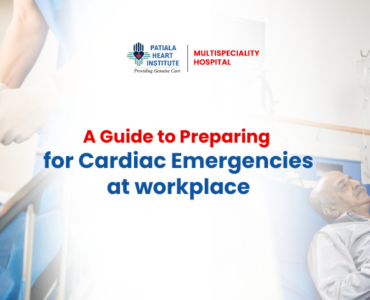In today’s fast-paced world, stress has become a constant companion for many. Whether due to work pressures, personal relationships, financial worries, or unexpected life changes, stress can manifest in numerous ways and often goes unnoticed until its consequences are severe. One of the most concerning impacts of chronic stress is its effect on heart health.
The link between stress and heart health is well-established, with research showing that prolonged stress can contribute to high blood pressure, heart disease, and other cardiovascular conditions. However, understanding the relationship between the two and how to manage stress and heart disease effectively can lead to a healthier, longer life.
In this blog, we will explore the biological mechanisms of the connection between stress and heart disease and provide actionable advice for managing stress and protecting your heart.
Understanding Stress: What It Is and How It Affects Your Body
What Is Stress?
Stress is a natural physical and emotional response to external pressures or demands, often called stressors. Stress is not inherently bad; it can be beneficial in small amounts by motivating us to meet deadlines, solve problems, and avoid danger. This is known as acute stress, which triggers the body’s “fight or flight” response. However, when stress becomes chronic—lasting for extended periods—it affects the body negatively.
How Stress Affects the Body
When you encounter a stressful situation, your body undergoes a series of physiological changes, such as the release of adrenaline and cortisol, which prepare you to react quickly. This increases your heart rate, elevates your blood pressure, and redirects blood flow to muscles, preparing you for action.
In the short term, this response is helpful. However, chronic heart stress symptoms lead to wear and tear on the cardiovascular system over time. When your body is constantly in this heightened state, it can result in:
- Elevated blood pressure (hypertension): Consistently high blood pressure forces your heart to work harder, increasing the risk of heart disease.
- Inflammation: Chronic stress can lead to inflammation in the arteries, a key contributor to heart attacks and strokes.
- Unhealthy behaviors: Stress often leads to unhealthy coping mechanisms, such as smoking, overeating, alcohol consumption, or inactivity, all of which can negatively impact heart health.
The Connection Between Stress and Heart Health
Biological Mechanisms Linking Stress and the Heart
Stress affects the heart through several biological pathways:
- Cortisol and Adrenaline: Chronic stress keeps your body in a state of constant activation, leading to overproduction of the stress hormones cortisol and adrenaline. These hormones elevate the average heart rate when stressed and high blood pressure, increase cholesterol levels, and promote blood clotting, increasing the risk of heart attack or stroke.
- Sympathetic Nervous System Activation: Stress activates the sympathetic nervous system, triggering the “fight or flight” response. This system increases heart rate and redirects blood flow away from non-essential organs. Over time, prolonged activation can damage blood vessels and increase the risk of heart disease.
- Inflammation: Chronic stress is linked to systemic inflammation. Inflammation can damage the arterial walls and contribute to plaque buildup, a condition known as atherosclerosis, which narrows the arteries and limits blood flow to the heart.
Stress-Related Heart Conditions
Here are some heart-related conditions that are influenced or exacerbated by stress:
- Coronary Artery Disease (CAD): CAD is caused by plaque buildup in the coronary arteries, leading to reduced blood flow to the heart. Stress-induced inflammation accelerates this process.
- Heart Attack: Acute stress can trigger a heart attack, especially in individuals with underlying cardiovascular conditions. The surge of stress hormones can cause plaque in the arteries to rupture, leading to a blockage.
- Hypertension (High Blood Pressure): Stress contributes to high blood pressure, which forces the heart to work harder over time and weakens the arterial walls.
- Tachycardia: Prolonged stress can lead to tachycardia, a condition where the heart beats abnormally fast, increasing the risk of heart failure or stroke.
- Cardiomyopathy: Often referred to as “broken heart syndrome,” stress-induced cardiomyopathy is a condition in which extreme emotional stress causes temporary heart dysfunction, mimicking the heart stress symptoms.
Managing Stress to Protect Your Heart: Essential Tips
While stress is unavoidable, there are numerous effective strategies for managing it in ways that support heart health. By integrating these techniques into your daily routine, you can reduce the harmful effects of stress on your heart.
1. Practice Mindfulness and Meditation
Mindfulness practices, such as meditation, deep breathing exercises, and progressive muscle relaxation, have been proven to reduce stress and lower blood pressure. These techniques help calm the mind, regulate the nervous system, and reduce the body’s stress response.
- Meditation: Even practicing meditation for 10-15 minutes daily can help lower heart rate and blood pressure, promoting relaxation.
- Deep Breathing: Deep, diaphragmatic breathing slows down the heart rate and promotes calm, countering the effects of stress.
- Progressive Muscle Relaxation: This technique involves tensing and relaxing different muscle groups, reducing tension and promoting relaxation.
2. Exercise Regularly
Physical activity is one of the most effective ways to combat stress and improve heart health. Exercise triggers the release of endorphins, the body’s natural mood elevators, and helps lower stress hormones like cortisol.
- Aerobic Exercise: Walking, jogging, swimming, or cycling can improve cardiovascular health and reduce stress. Aim for at least 150 minutes of moderate-intensity exercise per week.
- Strength Training: Building muscle through resistance training improves physical health and enhances mental resilience.
- Yoga: Yoga combines physical movement with mindfulness and breathing exercises, making it an excellent option for reducing stress and improving heart health.
3. Maintain a Healthy Diet
Stress can often lead to emotional eating or poor dietary choices, such as high-fat, high-sugar, or high-sodium foods. These foods can raise blood pressure and cholesterol levels, contributing to heart disease.
- Eat a Heart-Healthy Diet: Eat whole foods like fruits, vegetables, whole grains, lean proteins, and healthy fats (such as those found in nuts, seeds, and fish). These foods are rich in nutrients that support heart health and help reduce stress.
- Limit Processed Foods: Processed foods often contain added sugars, unhealthy fats, and high sodium levels, which can negatively impact your heart and contribute to stress.
4. Get Adequate Sleep
Chronic sleep deprivation can increase stress levels and raise the risk of heart disease. Stress, in turn, can disrupt sleep patterns, leading to a vicious cycle of poor sleep and heightened anxiety.
- Establish a Sleep Routine: Aim for 7-9 hours each night. Create a calming bedtime routine that promotes relaxation, such as reading, taking a warm bath, or practicing deep breathing exercises.
- Limit Stimulants: Avoid caffeine and other stimulants in the afternoon and evening, as they can interfere with sleep quality.
5. Develop Healthy Coping Mechanisms
When faced with stress, it’s essential to develop positive coping mechanisms rather than turning to unhealthy habits like smoking, alcohol, or overeating.
- Talk It Out: Sharing your thoughts and concerns with a trusted friend, family member, or therapist can help alleviate stress and gain perspective.
- Engage in Hobbies: Participating in activities you enjoy, such as reading, gardening, painting, or playing music, can reduce stress and improve your mood.
- Practice Gratitude: Keeping a gratitude journal and focusing on positive aspects of life can shift your mindset and help reduce the impact of stress.
6. Seek Professional Help When Needed
If stress becomes overwhelming or unmanageable, seeking professional help is crucial. Therapists and counselors can provide tools and strategies to help you manage stress more effectively.
- Cognitive Behavioral Therapy (CBT) is a proven method for addressing negative thought patterns and behaviors that contribute to stress.
- Stress Management Programs: Many healthcare providers offer programs that teach stress management techniques and provide support for individuals dealing with chronic stress.
Stress and Heart Health: A Holistic Approach
Monitor Heart Health Regularly
Regular check-ups with a healthcare provider are essential for monitoring heart health, especially if you are dealing with chronic stress. Regular blood pressure readings, cholesterol checks, and stress tests can help detect early signs of heart disease and allow for timely intervention.
- Blood Pressure: High blood pressure is a silent killer that can go unnoticed for years. Regular monitoring helps ensure that it stays within a healthy range.
- Cholesterol Levels: High cholesterol is another significant risk factor for heart disease. Keeping cholesterol levels in check through diet, exercise, and medication (if necessary) is crucial.
Use Technology to Track Stress and Heart Health
Technology can also help manage stress and heart health. Wearable devices like fitness trackers and smartwatches can monitor heart rate, physical activity, and even sleep patterns, providing valuable insights into how the body responds to stress.
- Heart Rate Variability (HRV): HRV measures the variation in time between heartbeats, and it’s often used as an indicator of stress. A higher HRV generally indicates lower stress and better heart health.
- Stress Management Apps: Several apps can help you track stress levels and provide guided relaxation techniques, breathing exercises, and mindfulness practices.
Conclusion: Managing Stress for a Healthier Heart
Various types of heart attacks caused by stress, when left unmanaged, can have serious consequences for your heart health. By understanding the link between stress and cardiovascular health, you can take proactive steps to manage both effectively.
Incorporating healthy habits such as regular exercise, mindfulness, a heart-healthy diet, and proper sleep can help reduce stress and support heart health. Developing positive coping mechanisms and seeking professional help when necessary will also provide long-term benefits.
Remember, stress management is not about eliminating stress entirely but about finding balance and learning how to cope with life’s challenges in a way that protects both your mental well-being and heart health. Taking steps today to manage stress will pay off in the long run by ensuring a healthier heart for years.
So, are you searching for a Cardiologist in Patiala? Visit the best heart hospital in Patiala today and get your heart examined.







